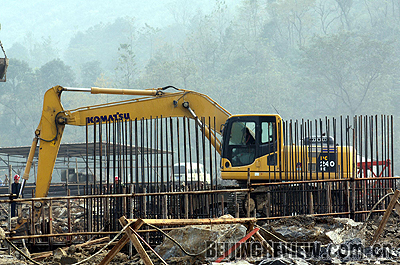|

Numbers of the week
313
As of December 24, altogether 313 of the world's top 500 companies had set up trade unions on the mainland with a total of 2.13 million members.
$1.5 billion
China is using a total of $1.5 billion in overseas preferential loans to rebuild its earthquake-hit areas.
TO THE POINT: For the fifth time in four months, the central bank slashed benchmark interest rates by 0.27 percentage points and reduced the reserve requirement ratio by another 0.5 percentage points to boost investment. The government, in the wake of plummeting international crude oil prices, lowered refined oil prices for the first time this year. China's foreign reserves shrank due in part to the outflow of foreign capital and the depreciation of the euro. The government adopted new measures such as raising tax rebates to encourage exports. Sina.com, one of China's largest Web portals, purchased the core assets of Focus Media, a NASDAQ-listed advertising company.
By LIU YUNYUN and HU YUE
Cutting Rates Again
China's central bank demonstrated its dedication to the implementation of an appropriately accommodative monetary policy by putting in place a new round of interest rate cuts effective from December 23. It was the fifth time the central bank had slashed interest rates this year in a bid to revive the nation's economy against the backdrop of global financial meltdown.
The benchmark one-year deposit rate was set at 2.25 percent, down 0.27 percentage points, while the benchmark one-year loan rate was fixed at 5.31 percent, also down 0.27 percentage points.
Meanwhile, the central bank lowered the reserve requirement ratio-the amount of money that lenders must put away with the central bank--by 0.5 percentage points to 13.5 percent, effective from December 25. Analysts expected the reduction would free up another 300 billion yuan ($44 billion) for banks to lend.
The two efforts were made in line with the Central Government's decision to reinforce an appropriately accommodative monetary policy, which was supposed to provide more loans to businesses to encourage business activities.
But investors and banks might still take a wait-and-see attitude despite the government incentives. "Banks will give loans to projects which they believe will be profitable and won't act heedlessly without calculating the risks, especially at this time of global economic slowdown," said Zhao Xijun, Deputy Director of the Finance and Securities Institute at Renmin University.
"Companies, on the other hand, are searching for worthwhile projects and dare not expand production or start new programs if the economic conditions do not allow them to do so," added Zhao, who believes there is still some room for rate cuts in 2009.
Fuel Price Cut
The government cut domestic fuel prices for the first time in almost two years, as it prepares to reorganize its regulated oil pricing regime. After years of discussion and debates, it has decided to reduce controls on domestic refined oil prices, taking advantage of the crash in global crude oil rates.
Pump prices were reduced by about 0.9 yuan ($0.13) per liter of gasoline and 1.1 yuan ($0.16) per liter of diesel on December 19, according to the National Development and Reform Commission (NDRC), the country's top economic planner.
The NDRC also reconfirmed its previously announced tax increase on a range of fuels to encourage more efficient energy use in the world's second-largest oil-consuming country.
Analysts believe the fuel price cut was introduced to help revive flagging economic growth by spurring oil consumption.
But the news came as a disappointment to many, because the price adjustment was much less than expected. The country's refined oil prices are still almost double those of the United States which have seen considerable plunges in the past months.
Up to now, China has adhered to a government-mandated oil pricing system that has helped curb inflation when international oil prices have run high. But it also has subjected the country's major oil refiners to dizzying losses and angered numerous taxi drivers who had been paying much more for gas than their American peers.
The price cut is expected to deliver a turnaround to domestic oil-consuming sectors, such as airlines, said Li Shuyong, a senior analyst at Shenyin & Wanguo Securities Co. Ltd., in a printed statement.
But analysts say the price cut and tax hike also may squeeze the earnings of the major oil refiners, which have started making profits after a prolonged period of losses. But from the long-term perspective, a more flexible and marketized price regime would be in the interests of the refiners, they said.
Shrinking Foreign Reserves
The country's ballooning foreign reserves, jacked up mainly by its trade surplus and foreign direct investment, showed signs of shrinkage in the last few months.
Cai Qiusheng, a senior official at the State Administration of Foreign Exchange (SAFE), said at an import and export meeting in Beijing in December that SAFE's latest statistics showed that the foreign reserves had declined in recent months for the first time since December 2003.
"The foreign reserves once stood as high as over $1.9 trillion, and the current amount is definitely lower than $1.9 trillion," Cai said.
China's foreign reserves have swelled in recent years, prompting criticism from the international community about its trade policies. The latest decline indicated that some foreign investors pulled their money out of mainland markets to invest in safe havens elsewhere in the midst of the global financial turmoil.
| 